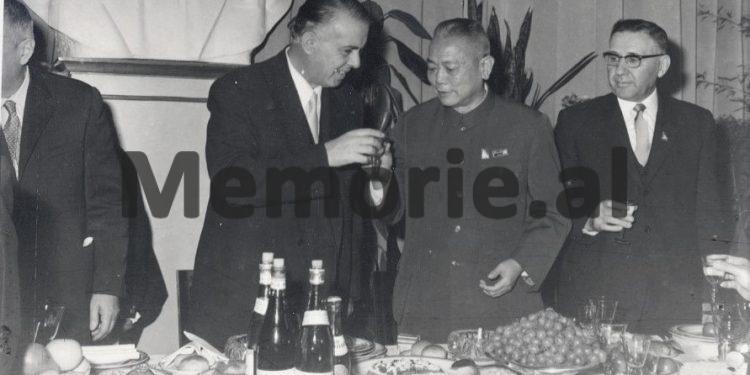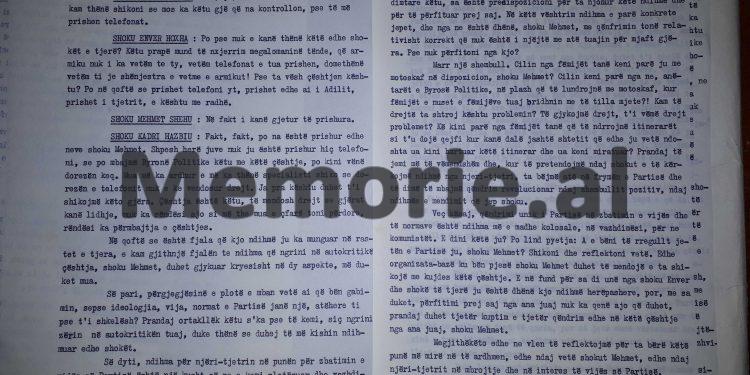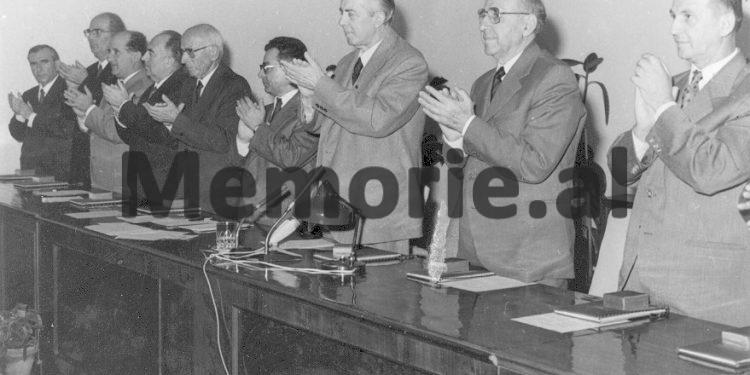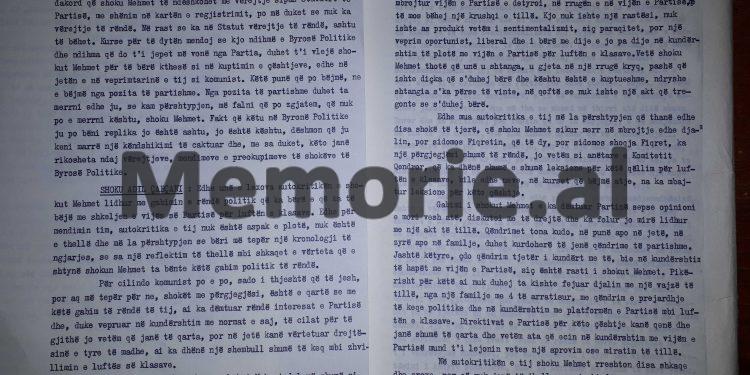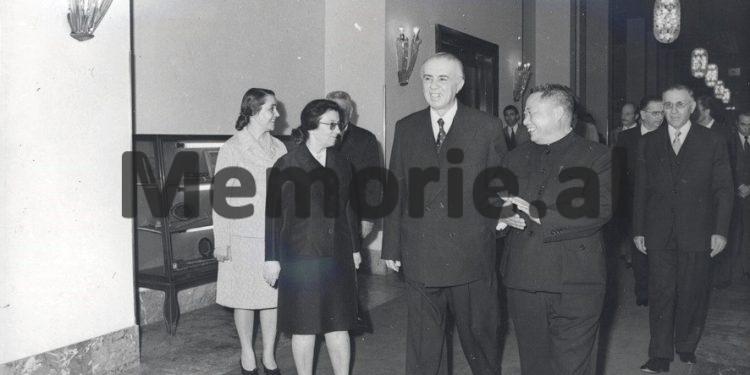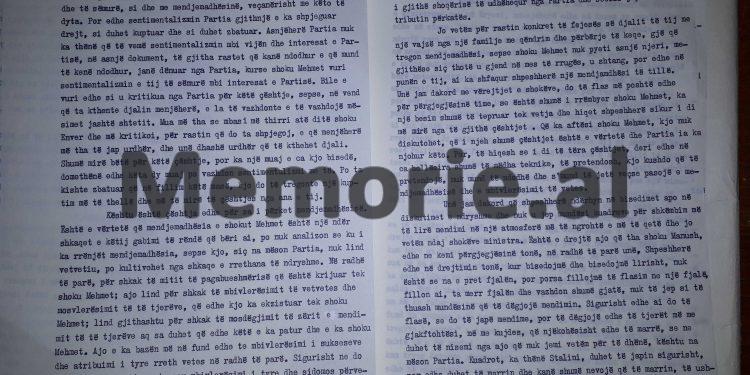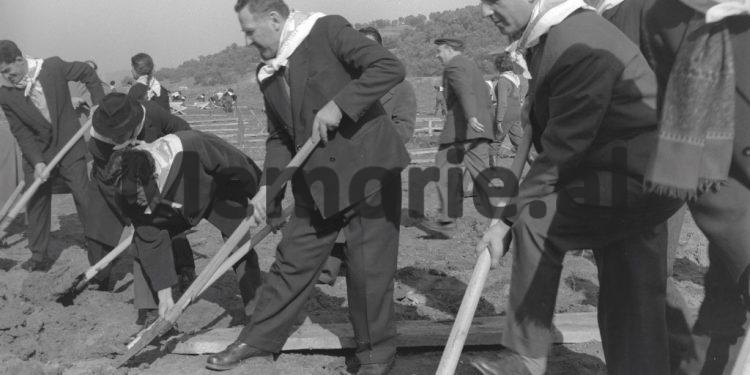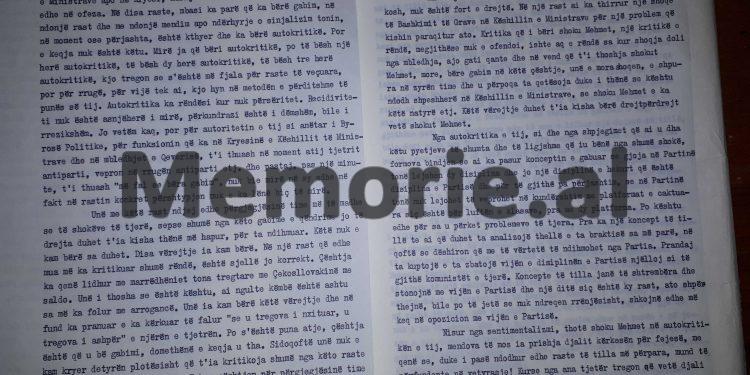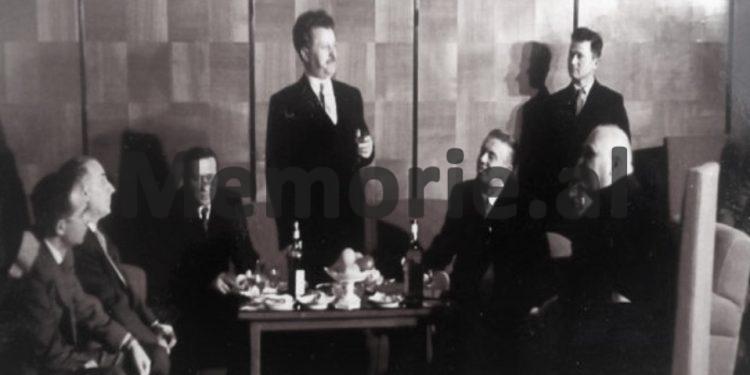Dashnor Kaloçi
Part thirty-seven
Memorie.al publishes some documents issued by the Central State Archive (fund of the former Central Committee of the ALP), where there is a voluminous file with archival materials which bear the logo ‘Top secret’, which belong to the period of years 1981-1982, with reports, reports, evidence, information, minutes of the meetings of the Politburo and the secretariat of the Central Committee of the ALP, etc., starting from what was held to review and analyze the self-criticism of the former Prime Minister Mehmet Shehu in December 1981, because he had allowed the engagement of his son, Skënder, “with a girl who had some political fugitives in her family circle”, the marathon meeting of the Politburo on the afternoon of December 17 his year that continued until the late hours of that night, where that problem was discussed with the debates and discussions of all members who “crucified” former Prime Minister Shehu, the meeting of the morning of December 18, after the news that Prime Minister Mehme t Shehu had killed himself, the marathon meeting of the Secretariat of the Central Committee of the ALP on September 20, 1982, with the topic: “Analysis of serious mistakes of Kadri Hazbiu, committed during the period when he was deputy minister and minister of Internal Affairs ”, where Enver Hoxha initially started accusing Kadri Hazbiu, luring him as a“ loyalist of the Party ”, (in order for him to“ open his heart to the Party ”, speaking against former Prime Minister Mehmet Shehu) , where at the beginning of his speech, Enver said: “After the coup in the army, we discovered the traitorous group in economics of Abdyl Këllez, Koço Theodhos and Kiço Ngjela with friends. We also discovered this group here; it was not discovered by the State Security. The same can be said about the discovery of the group of Fadil Paçrami, Todi Lubonja and a number of other people connected with them, such as Ismail Kadareja with friends, the Security did not reveal, but that hostile work was discovered by the Committee Central, etc. ”! All these and other documents with the logo ‘Top secret’, will be published in several issues in a row, exclusively by Memorie.al
Continued from the previous issue
ALBANIAN LABOR PARTY
CENTRAL SECRETARY COMMITTEE
-General Sector-
PROCESS – VERBAL
OF THE MEETING OF THE POLITICAL BUREAU OF THE CENTRAL AFFAIRS OF THE ALP DATES
17 E 18 DECEMBER 1981
Agenda: Analysis of the serious mistake made by the member of the Politburo, Mehmet Shehu, regarding the engagement of a boy with a girl with a very bad political composition.
This meeting is attended by all members of the Politburo, with the exception of Comrade Hekuran Isai, who did not come because his mother died last night.
COMRADE ENVER HOXHA: Listen, Mehmet, this job is not about the enemy.
COMRADE MEHMET SHEHU: No, no, I did not say that, I said: look, if there is nothing here that controls us, why should my phones be broken?!
COMRADE ENVER HOXHA: But why did no other friends say that? Here again we can bring out your megalomania, that the enemy does not have only you, only your phones break down, that is, only you are the only target of the enemy! Why put it this way? What if your phone breaks, so does Adil, you’re other breaks, and so on?
COMRADE MEHMET SHEHU: In fact, they found them broken.
COMRADE KADRI HAZBIU: Fact, fact, yes, our friend Mehmet has also broken down. Often times your phone has not been broken, because we are keeping the Politburo here with this issue, you have put the handle badly.
A specialist came to me and told me, look, you did not put the phone handle correctly. This is how we should look at these things. The point is here, to think straight that things are related, it does not matter how she told me and what tone you use, it matters the content of the issue.
If the word is that you have lacked this help in other cases, I always mean the help you raise in self-criticism, the issue, comrade Mehmet, should be judged mainly in two aspects, it seems to me.
First, the full responsibility lies with the one who makes the mistake, because the ideology, the lines, the norms of the Party are one, then why do you violate them? So there is no partnership, here my friends should have helped me too.
Second, helping each other at work to implement the Party line is a condition that we have met and continue to meet mutually, regardless of the shortcomings. But the good has no end, and therefore we must look critically at the position on this issue, and it is fair to say that, it is crucial here, that is the predisposition to recognize this help and benefit from it. In this regard, concrete first aid is given and given by us, Comrade Mehmet, with our relatively correct attitude, which is not the same as yours for many things. Why not take advantage of this?
Take an example. Which of our children have you seen with a speedboat available, Comrade Mehmet? Which one of you, the members of the Politburo, saw on the beach sailing on a speedboat, when your children’s children and brides roamed with such vehicles?! Do I have the right to put the problem this way? To judge correctly, to put problems right?
Have you ever seen our children change their itineraries as they please when they went abroad, that you may have drafted and approved this itinerary for them? Therefore, we should be more attentive when we pretend to be a positive example, to the help of the opinion given by the friend.
In addition, the unique position of the Party in the implementation of the line and norms is the greatest colossal aid to us communists. Do you know this? The question arises: Do you, Comrade Mehmet, make the life of the Party orderly? See and reflect for yourself. Even the basic organization where Comrade Mehmet belongs should think and look carefully at this issue.
And in the end, as far as I know from Comrade Enver and other comrades, you have been given this help from time to time, but, apparently, the benefit from it on your part, has not been what it should be, therefore it needs another meaning and another attitude in this matter on your part, Comrade Mehmet.
Despite all this, it is also worth reflecting on doing this work better in the future, both towards Comrade Mehmet himself, and towards each other in defense and in the interest of the Party line.
Judging entirely the mistake of comrade Mehmet, from this point of view I said, I think his responsibility is heavy and the task great, here and there. As for the first, I think that Comrade Mehmet, to be punished with a reprimand according to the Party Status, with a note on the Registration Card, but it seems to me that there are no serious reprimands.
In case there are serious remarks in the Statute, so be it. As for the second, I think that this help of the Politburo, and the help that will be given later by the Party, should be worthwhile to comrade Mehmet, to make a turn both in terms of issues, and in his life and activity as a communist. This work that we are doing, we are doing in a partisan position.
From these positions, you should also take that I have the impression, forgive me that I am prolonging, that you are not taking it like this, Comrade Mehmet. The fact that here in the Politburo you are making remarks, it is not so, it is not so, proves that you have taken a certain point of view and apparently these are ricochets against the remarks, preoccupations, and opinions of the comrades of the Politburo.
COMRADE ADIL ÇARÇANI: I, too, read the self-criticism of Comrade Mehmet, regarding the serious political mistake he has made, which has to do with the violation of the Party line for the class struggle. Even in my opinion, his self-criticism is not complete at all, it is not deep, and it left me with the impression that he did more of a chronology of the event, than a deep reflection on the real reasons that pushed comrade Mehmet to do so serious political error.
For any communist, no matter how simple it may be, just as much for us, it is clear that with this grave mistake of his, he has severely damaged the line of the Party, acting contrary to its norms, which for all are not only clear, but in life have proved their great justice, he has set a very bad example in the conduct of the class war.
Reading his self-criticism, it turns out more as if this mistake was rather a coincidence, which he could not grasp. And that he corrected when the Party intervened, when Comrade Enver called him and told him that this should not be done. So rightly so, and to defend the Party line, compelled him not to make such a marriage.
This was not a coincidence, nor was it a product of sentimentality, as it is presented to us, but only an opportunistic, liberal, and deliberate action, in complete contradiction with the Party line, for the class struggle. Comrade Mehmet himself says that I was stunned, I happened to be on a dead end, I saw that it was something that should not be done, and so it is all understandable otherwise the stupor. There was no need for him to come if it was an action that should not have been taken.
His self-criticism also left me with the impression that he left to other friends, that comrade Mehmet defends his son, especially Fiqret. Comrade Fiqret, has a very heavy responsibility as a member of the Politburo, and of the Central Committee, and even in the courses we hold there, she has given us lectures on these issues.
Comrade Mehmet’s mistake has hurt the Party because the public found out about it, discussed it rightly, and spoke ill of this act. Our attitudes everywhere, at work and in life, in the office and in the family, must always be partisan attitudes. Outside of these, any other stance contrary to it, openly contradicts the Party line.
Precisely for this, he should not have engaged the boy, with such a girl where from her family there are 4 fugitives, with bad attitude and political background. The Party directives on these matters have been and are clear, and only those who oppose them could afford such approval.
In this self-criticism, Comrade Mehmet lists some causes and reasons that are not in-depth, not convincing, as the comrades said. He links his mistake to bourgeois sentimentality as well as to arrogance. But the Party has also correctly explained sentimentality, how it should be understood and how it should be implemented. The Party has never said that sentimentality should be put above its own interests. While Comrade Mehmet put his sick sentimentality above the interests of the Party.
He even put it up, even after he was criticized by the Party for the issue, because instead of returning the boy immediately, he left him to continue his studies abroad. He told me that after Comrade Enver called me, he criticized me for the case that I would explain, and that he immediately told me to give the order, and I gave the order for the boy to return. You did very well on this issue, but this conversation has been going on for a month or so, i.e., even these two months sentimentality is continuing with it. Had he implemented this measure from the beginning, it would have shown a deeper understanding of the issue on his part.
So it is with arrogance. It is true that Comrade Mehmet’s arrogance is the real cause of his mistake. But he does not analyze where arrogance has its roots. In the first place, due to the myth of infallibility that has been created in Comrade Mehmet, it arises due to the overestimation of oneself and the lack of appreciation of others.
He is also born and because he does not listen to the opinion of others, this is what his friend Mehmet had and still has. It is also based on overestimating successes and attributing them around oneself, in the first place. Of course, we will appreciate the successes, but their overestimation and especially self-appropriation, creates and encourages more, arrogance.
Not only for the concrete case of his son’s engagement, with a girl with a bad political make-up, he shows arrogance, because comrade Mehmet did not ask anyone, although as he says he was in the middle of the road, but also in his work he has shown arrogance. I agree with the remarks of friends, and I will talk below about my responsibility. Comrade Mehmet, is very obsessed with him, and removes himself as if he knows all the issues well.
That comrade Mehmet has skills, this is not discussed, and that he knows the issues very well, the Party has known them. But to pretend to know all the details in detail can be nothing but arrogance and self-esteem.
I agree that it often interferes in various conversations and discussions between friends, and that gives the staff the opportunity for a free exchange of opinion, in a warm atmosphere. It is right what Comrade Manush said, that we also have our responsibility, in the first place I do. Often and when we talk freely, it is not that he waits for our word, but as soon as we begin to speak, he takes our word and keeps talking, without leaving us the opportunity to hear our opinion.
Of course, he will say that he will give opinions, but he will listen to others calmly and more carefully, so that at the same time he will accept that we are not just to give as the Party teaches us. The cadres, Stalin said, must give of course but also receive. This flaw is highlighted by Comrade Mehmet. Several times he has manifested such performances in the Council of Ministers or in the Presidency, sometimes in serious form, even in offenses.
In some cases, after seeing that he made a mistake, in some case and with some thought or intervention or signaling our tone, in the moment or outside, he turned and made self-criticism. But evil is not here. Well, he did self-criticism, this shows that it is no longer about isolated cases, but about the road, about coming to him, this is part of his daily method of work. Self-criticism matters when it is not repeated. Relapse is never good; on the contrary it is harmful, even dangerous.
Not only that, but for his authority as a member of the Politburo, for his function in the Presidency of the Council of Ministers and in the meetings of the Government, to say at one point to the other: anti-party, acts in the way anti-party, etc., and then after a minute, to say to him “I’m sorry I made a mistake”, does not stand out well and in fact in this case, the impression does not leave any good.
On this occasion, I feel my greater responsibility than that of other friends, because many of these mistakes and unjust attitudes, I should have told him openly, to help him. I did not do this enough. I made some remarks. In a case where he also criticized me very badly, he behaved incorrectly. The issue has been related to our trade relations with Czechoslovakia, with the balance. I told him it was so, he insisted it was so, as he spoke to me arrogantly. I made this remark to him and finally, he accepted and apologized “because I was in a hurry, I was harsh”, both.
If it’s not there, the point is that it was a mistake, that is, the evil was said. However, I did not fully fulfill the task of criticizing many of these cases even at the Government meeting. I have the issue of my responsibility in this case, yes and especially, that I had more frequent contacts with him and I should have pointed him out, helped him. This to me is a lesson, a self-criticism. Memorie.al
The next issue follows




